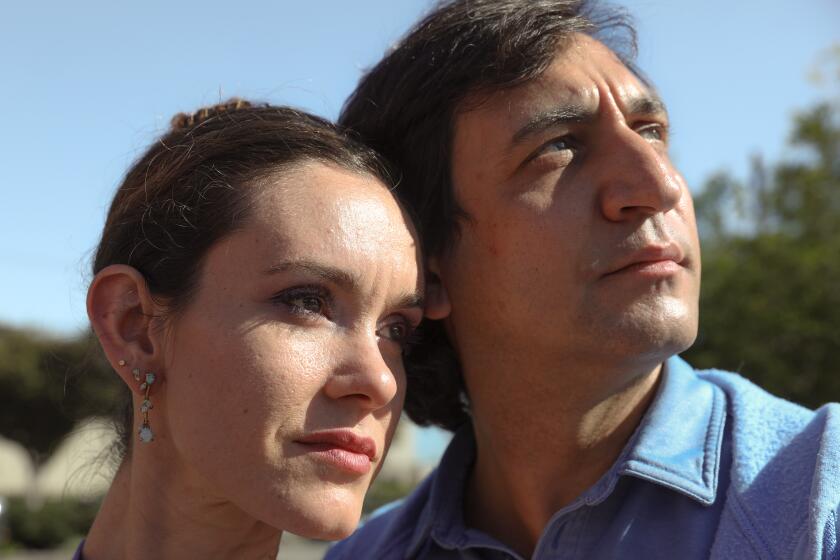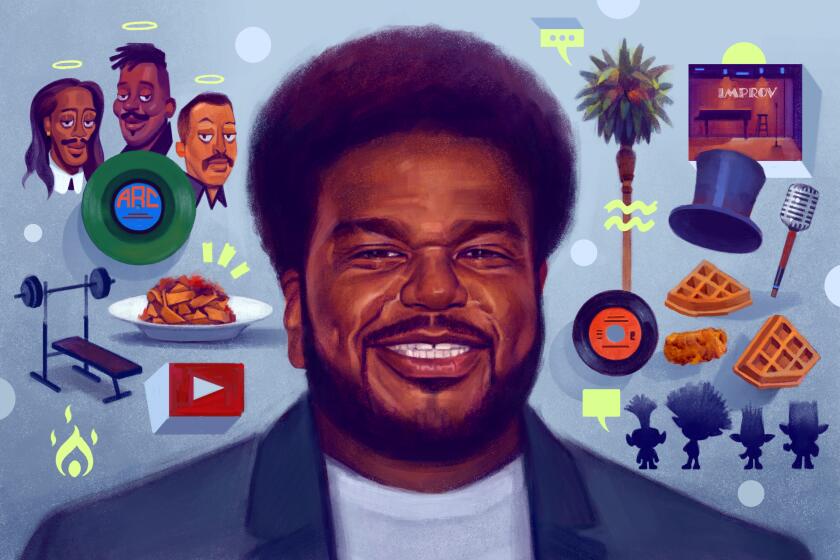Are you going through a high-conflict divorce?

The bleak statistic that half of marriages end in divorce has been in the zeitgeist for so long now that it’s become a punch line.
But for those who do experience it, divorce is anything but funny ( ... most of the time). It’s a tear in the fabric of the universe as you knew it.
“Imagine spreading everything you care about on a blanket and then tossing the whole thing up in the air,” Amy Poehler wrote in her memoir “Yes Please.” “The process of divorce is about loading that blanket, throwing it up, watching it all spin, and worrying what stuff will break when it lands.”
That sounds about right. A Group Therapy reader asked us to explore this seismic life event: “I would love to see your column address the complexities of divorce. It is a powerful and complex transition.”
To answer this question I spoke with Virginia Gilbert, a psychotherapist in North Carolina who specializes in couples work and divorce. Gilbert’s book “Transcending High-Conflict Divorce” serves as a guide for folks who find themselves at a painful impasse with their former partners, making it hard for them to start their next chapter.
Our conversation has been edited for length and clarity.
A Q&A with divorce therapist Virginia Gilbert
Group Therapy: How did you end up specializing in divorce as a therapist?
Virginia Gilbert: I went through my own really, really terrible divorce about 20 years ago. And at that time, most therapists were trained in the “good divorce” model, which was a book by Constance Ahrons. And her idea was that if you did a bunch of basic things, you could keep the family together even though it was not an intact family. But that was not something I could do with my ex-husband. I felt a lot of shame because my situation was so different, and whatever therapist I went to, I just didn’t feel like they got it. I felt like I was getting a one-size-fits-all model.
I started doing my own research and I realized that there’s something out there called a “high-conflict divorce” and it was completely different from what I call a garden-variety divorce. (I also want to say that when I’m talking about high-conflict divorce, I’m not talking about domestic violence.) So I became the therapist I wished I’d had when my divorce was at its worst. My ex and I are now really cordial, so I know from a personal standpoint that things can get better, but you have to change your behaviors.
I was a contributor for HuffPost Divorce and I wrote an article called “What Therapists Don’t Tell You About Divorcing a High-Conflict Personality.” I think I got like 150 emails from people saying, “Oh my God, you’re sort of the only person I’ve come across who understands this.” So I knew I was on to something.
There are so many circumstances that lead to divorce, and no two relationships are alike. But there are relational issues that, if they can’t be addressed, become catalysts for separation. Broadly speaking, can you talk about the most common causes of divorce that you see in your practice?
Having different values is a big one. If one person values non-monogamy and the other values monogamy, there’s very little way to bridge that difference. Sexual incompatibility and financial problems are also two of the main causes of divorce. And also addiction without recovery. If your spouse feels like the most important thing to you is your relationship to a substance and not to them, at some point they’ll get tired of playing second fiddle. With the chaos that addiction brings, maybe they’ll put up with it, but that leads to another set of issues.
I want to be very careful with how I say this because mental illness does not need any more stigma. But it’s really important that if you have a mental illness, that you’re accountable for managing your treatment. Like with addiction, if you’re not managing it, there can be just so many negative long-term consequences that pile up that eventually it becomes just too hard to live with.
Another one is mismatched adult attachment styles. I find that’s often the underpinning of many marital problems. For example, someone with an anxious attachment style that needs a lot of reassurance and contact pairing with someone who’s easily overwhelmed by the reasonable needs of their partner, and self-soothes by withdrawing. It’s not that you can’t modify your attachment behaviors; you can, but you have to be aware of it and work on it. Virtually all of the really high-conflict divorce couples I work with have different attachment styles.
You specialize in “high-conflict” divorce. What makes a divorce “high-conflict” and how do you support people in navigating them?
A high-conflict divorce is when two people stay psychologically engaged with each other, often years after the divorce is final. They aren’t sure how to shift the model of their relationship, and that keeps them from going through the necessary grief process and getting to radical acceptance — meaning you don’t have to like the fact that you’re divorced, but you’ve gotta accept that your reality is different.
There’s a man named Bill Eddy who’s a lawyer, social worker and mediator, and he has something called the High Conflict Institute. I really want to credit him because he did a very good job of identifying how people in high-conflict divorces exhibit certain traits, either one or both parties. They have unmanaged emotions, extreme behaviors, inflexible thinking, and there’s always a preoccupation with blame. Things will get better even if one person changes their behavior, because it changes the dynamic.
No. 1, you have to know when your nervous system is disregulated — when your emotions are all over the place. And you have to understand that when you’re not able to calm down, you are probably not interpreting events 100% accurately. So you need to learn coping skills (and I like CBT and mindfulness principles) to self-soothe before you try to communicate with your ex. Something I often see is somebody with a disregulated nervous system interpreting something their ex did. They have a big reaction and try to communicate with them in that moment, and conflict gets worse.
I also guide people through an effective communication protocol. It’s really just learning how to take all emotion and opinion and advice out of communication, especially electronic communication, because so much conflict is driven through emails and texts.
Some people stay focused on their ex so they don’t have to focus on themselves and their own issues. So it’s really important to do your own personal growth work, which should involve a connection to something bigger than yourself. I’m not pushing religion, but a connection to nature, to your community, to anything that helps you see beyond your own problems. Even if your ex is a total jerk, you still need to be able to shift the focus to yourself and take accountability for your own behaviors that you need to change.
Our reader asked about the complexities of divorce. Why does divorce tend to be so complicated?
The short answer is kids and money, because divorce changes your relationship to both. It’s incredibly destabilizing. If you and your partner couldn’t resolve things in a marriage, in some ways you have less incentive to solve them once you’re divorced, because you aren’t getting the benefits of marriage. And then if you throw in high-conflict behaviors and a legal system that is inherently adversarial, you just get very complicated situations.
The biggest thing people fight over is the kids, parenting philosophies, who should get more time with them, etc. I want to stress that kids can suffer more in a high-conflict intact marriage than an amicable divorce with low conflict. It hurts kids because they don’t have parents who model conflict resolution skills, which is critical for anyone in any kind of relationship. It gets even more complicated if kids feel they have to take sides, which is really toxic.
Divorce is often the best option for everyone involved, including children. I know that many divorced parents work hard to keep their relationship friendly for the sake of their kids. When is this type of dynamic possible? What can it look like?
It can work when people accept they’re no longer romantic partners and their job now is to be business partners. You have to think of yourselves as co-CEOs of a company called Daisy and Sam, or whatever the names of the kids are. You don’t have to like your business partner, you just have to work together so the company runs smoothly. This is possible when two people go through the grief process, accept the new reality of their lives, and do the opposite of what high-conflict people do — meaning they learn how to manage their emotions. They exhibit consistent, reasonable behavior. They take accountability when they do screw up and they use flexible thinking. If you feel the only way to solve a problem is your way, you’ll drive conflict and your kids will be stuck in the middle of it.
Divorce is almost always hard, but it impacts people differently depending on who they are and the relationship they were in. Can you talk a bit about the different kinds of mental and emotional effects of divorce?
The chickens come home to roost in divorce. Any kind of attachment wounds with parents or relatives, any losses earlier in life, divorce tends to echo those losses — but the echoes are, like, on steroids. I’ve never seen an ugly divorce that wasn’t another iteration of intergenerational trauma in either one or both parties. If you felt abandoned or mistreated by a parent, if you come from a family with a history of family feuds and cutoffs, and you realize you didn’t get to reverse that hurt in a good marriage — that can really keep people in emotional turmoil.
A lot of people really believe a narrative they have about their ex being unfair, the divorce being unfair. The legal system’s unfair. And I think in many instances, the legal system does get it wrong, but if you are preoccupied with the unfairness narrative, you will just get angrier. You’ll feel more ashamed, and you’ll resort to blaming as a way to defend against the shame and the sadness.
Depending on the person’s personality, they might withdraw and feel isolated from others, or they may seek justice. So you see this with people going to court for minor issues, convinced that the judge will deliver justice, or people who form an alliance with the kids against the other parent. I’m not talking about cases where parents are truly dangerous. This is when one parent may be a little too lax, or not the most emotionally attuned parent, and the high-conflict co-parent is convinced the children are going to suffer, and then just creates more conflict by trying to control the other parent’s parenting.
Besides anger, sadness, and shame, fear and anxiety are the primary emotions people experience, leading to a preoccupation with the unknown. “What will happen to my kids? How will I co-parent with my ex when we can’t agree on anything? Will I be OK financially? Where will I live? What will my life look like in 20 years? Will I find love again?”
It’s normal to be worried about a zillion things since so much is changing. But not everything they worry about will happen, and worrying about all those things won’t make them better. The most effective way to manage anxiety is to acknowledge the feelings and shift your focus to what is actually happening now, not the worst-case scenarios that haven’t and may never happen. And also utilize self-soothing techniques such as diaphragmatic breathing and mindfulness.
The number of couples who are continuing to live together after they divorce is on the rise because of cost of living. What are your thoughts on this trend? Can it work?
I have seen people try this. I’ve never seen anyone do it successfully for an extended period of time. It’s pretty hard to go on with your life when you’re face-to-face with your ex every day. It’s confusing, and a cognitive dissonance. You’re divorced, but you’re still in the same house. You’re still functioning a little bit as a family. It can be harder to date and I think it’s confusing for the children, who are probably always going to want you to get back together. I’ve seen it really keep people stuck. Not to say that nesting can’t work, I just think it’s pretty challenging. It works better if it’s a short-term thing, maybe six months to a year to let the kids adjust to things.
What advice do you have for our readers who are considering divorce or are going through a divorce right now?
They should ask themselves if they’re clinging to hope that they can say or do something that will one day give their ex an epiphany. So they will change their entire personality. Embrace the Buddhist concept of radical acceptance. You don’t have to like your ex or your divorce, but trying to change things you can’t change will cause more suffering. So figure out what you can change. You can change your own behavior, you can change what you do in your home.
I also very strongly believe that divorce can be a catalyst for personal growth. So if you focus on coming up with a new mission statement for your life, like — what is this next chapter going to be about? What are my action steps for creating a life that’s more meaningful? If that’s where you put your energy, things are going to start to get better.
I also think it’s really helpful to concentrate on being a good role model for the kids and making them feel safe. If you’re having a hard time managing your emotions and you badmouth the other parent to your children, or you are really irritable, you are showing them to be afraid of hard things. You’re not showing them how to handle adversity. It’s totally appropriate to tell your kids you’re feeling sad or you’re having big feelings — in fact, that will let them know it’s OK for them to talk about their own feelings. Just remind them that everyone has hard things in life and this is your family’s “hard thing” right now and you’re going to be OK. You could then shift into talking about what people can do when they feel sad, like talking to a friend, hanging out with a pet, exercising or reading a book.
. . .
What’s helped you through a big breakup or divorce? Drop us a line and we might share your thoughts in a future newsletter.
Until next week,
Laura
If what you learned today from these experts spoke to you or you’d like to tell us about your own experiences, please email us and let us know if it is OK to share your thoughts with the larger Group Therapy community. The email GroupTherapy@latimes.com gets right to our team. As always, find us on Instagram at @latimesforyourmind, where we’ll continue this conversation.
See previous editions here. To view this newsletter in your browser, click here.
Enjoying this newsletter? Consider subscribing to the Los Angeles Times
Your support helps us deliver the news that matters most. Become a subscriber.
Other interesting stuff
America is getting lonelier and more indoorsy. “That loneliness and biophobia are rising in tandem may be more than a coincidence,” Hannah Seo writes for the Atlantic. “Environmental-studies researcher David Orr wrote in his 1993 essay that appreciation of nature will flourish mostly in ‘places in which the bonds between people, and those between people and the natural world create a pattern of connectedness, responsibility, and mutual need.’ The literature suggests that he’s right.”
Group Therapy is for informational purposes only and is not a substitute for professional mental health advice, diagnosis or treatment. We encourage you to seek the advice of a mental health professional or other qualified health provider with any questions or concerns you may have about your mental health.
Get Group Therapy
Life is stressful. Our weekly mental wellness newsletter can help.
You may occasionally receive promotional content from the Los Angeles Times.




